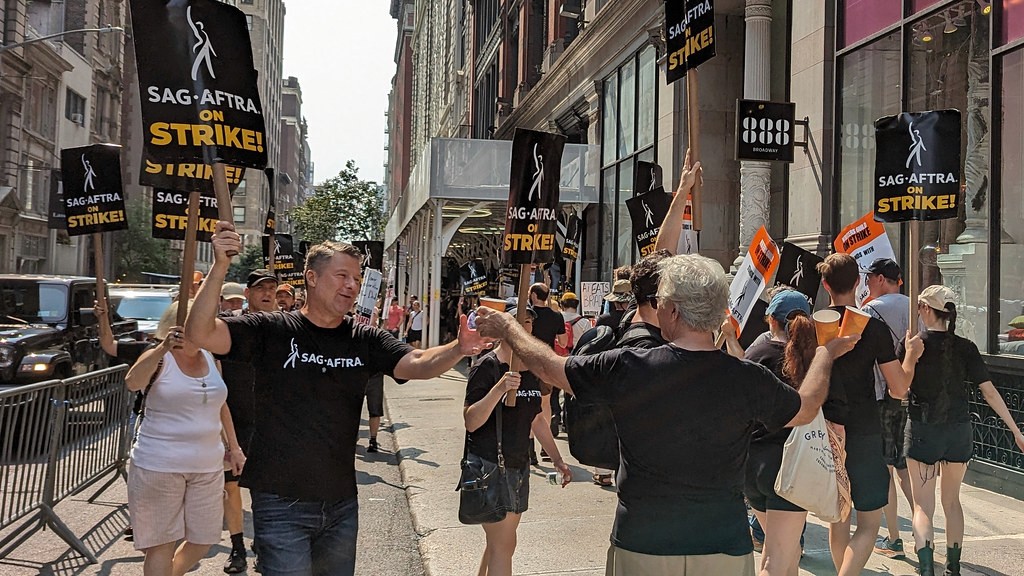Hollywood Writers and Actors Strike

The Writers Guild of America (WGA) and Screen Actors Guild-American Federation of Television and Radio Artists (SAG-AFTRA) both went on strike against The Alliance of Motion Picture and Television Producers (AMPTP) throughout the summer of 2023 over labor disputes involving wages, streaming services, and the use of AI.
The WGA is the largest labor union in the U.S. for TV, movie and other media writers, and the SAG-AFTRA is the largest labor union for actors. A labor union is an organization created by workers to represent the group’s collective interests and demands over topics like wages and working or safety conditions during negotiations with employers.
On May 2, 2023, the WGA went on strike, which is when workers/employees collectively agree to stop working to pressure their employers to meet the union’s demands. This caused many shows and movies such as The Tonight Show, Stranger Things, and Dune to stop producing live episodes or have their release dates postponed by months. The primary concern among the workers was that they were not receiving sufficient pay — and the main reason why comes down to the issue of streaming. Over the last few years, especially following the pandemic, the use of streaming services has significantly increased while the viewership of cable TV decreased.
And this has been disadvantageous to writers for two reasons. When shows are produced over cable TV, writers are paid more simply because they are employed for longer periods of time. A standard TV show (think of Friends, Seinfeld, Grey’s Anatomy etc.) runs for 22 episodes per season from the beginning of September to May. Writers are therefore typically hired for 40 weeks per year and paid per episode or per week. However, with the advent of streaming (think of Stranger Things, Abbott Elementary, Wednesday, etc.) has come shorter seasons with usually 8-12 episodes per season for a show. As a result, workers might be hired for only 8-10 weeks per year, and thus, paid less income. Additionally, writers are also paid less through residuals when shows are streamed. Residuals is money paid to writers each time their show is rerun on TV. However, on streaming, writers only receive one check no matter how many times people watch their show. Another issue has been the rise of AI. Many writers are concerned that in the near future, their jobs could be replaced partially or completely by AI technology, making the writers’ profession useless.
These issues have also been of concern in the SAG-AFTRA strike, which began on July 14, 2023. Due to the rise of streaming services, actors have similarly been employed for shorter times, while also being paid less in residuals. Both the WGA and SAG-AFTRA have called for higher pay and compensation, more protection over AI, improved employment terms, and better residuals. This is also the first time both labor unions went on strike simultaneously since 1960. The last time the WGA went on strike was 2007 while for the SAG-AFTRA, 1980.
On Sept. 27, 2023, the WGA strike ended as they agreed to a deal with the AMPTP that largely met their demands. The SAG-AFTRA strike came to an end on Nov. 9, 2023 through a billion-dollar deal that will give actors new benefits, and finally resume movie and TV filming production.
https://www.today.com/popculture/hollywood-actors-sag-strike-2023-explained-rcna94122
https://www.nytimes.com/article/actors-strike-why.html
https://www.vox.com/culture/2023/9/24/23888673/wga-strike-end-sag-aftra-contract
https://www.youtube.com/watch?v=b7ex8srthHA&ab_channel=TheWallStreetJournal
https://www.youtube.com/watch?v=ILaU78Oo7XM&t=3s&ab_channel=Vox
https://www.vox.com/culture/23696617/writers-strike-wga-2023-explained-residuals-streaming-ai

